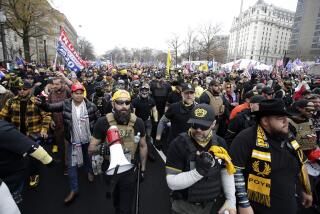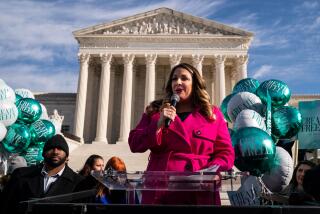Protecting the vile
- Share via
The word “vile” is inadequate to describe what members of the Westboro Baptist Church, a fringe group obsessed with homosexuality, did on the day of the memorial service for Marine Lance Corp. Matthew A. Snyder, who was killed in Iraq in 2006. The question for the Supreme Court is whether their despicable conduct is protected by the 1st Amendment -- and the answer is yes.
That day, Westboro’s pastor, Fred Phelps, and six relatives staged a protest near the church where services were held, though they remained at a distance. They carried signs reading “God hates the USA,” “God hates fags” and “Thank God for dead soldiers,” reflecting Phelps’ bizarre conviction that deaths of U.S. personnel in Iraq and Afghanistan are divine retribution for this nation’s tolerance of homosexuality. Westboro also posted on its website absurd accusations that Snyder’s parents “raised him for the devil” and “taught him that God was a liar.”
Snyder’s father sued for defamation, invasion of privacy and intentional infliction of emotional distress. But an appeals court ruled that he isn’t entitled to $5 million in damages, a judgment the Supreme Court agreed this week to review.
Ugly as it was, the protest was an exercise of the same right of free speech that protected protesters who burned the American flag and Nazis who sought to march in Jewish neighborhoods in Skokie, Ill. In 1988, in a case in which the late Jerry Falwell sued Hustler magazine over a tasteless parody, the Supreme Court ruled that emotional-distress lawsuits must be judged in light of the 1st Amendment’s protection for “the free flow of ideas and opinions on matters of public interest and concern.” Deranged as Westboro’s view of the wars in Afghanistan and Iraq may be, it satisfies that definition.
As we have observed before, the 1st Amendment doesn’t require that mourners -- or others -- endure face-to-face intimidation or trespassing on private property. The court, for instance, has upheld buffer zones around abortion clinics. In 2006, Congress enacted a law establishing similar zones around military cemeteries during burials.
But the Constitution doesn’t allow the government -- including courts in a private lawsuit -- to muzzle political speech, however crass, nonsensical or disrespectful. In fact, it is often the most outrageous opinions that require the protection of the 1st Amendment. Popular and patriotic sentiments seldom lead to reprisals.
Given the court’s past defense of what Justice Oliver Wendell Holmes Jr. called the “expression of opinions that we loathe,” it’s unsettling that the justices have agreed to review the appeals court’s decision. We hope that, after reflecting on the importance of free speech, they will affirm it.
More to Read
Sign up for Essential California
The most important California stories and recommendations in your inbox every morning.
You may occasionally receive promotional content from the Los Angeles Times.













